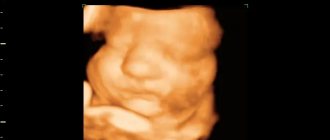16.07.2020 44405 0
The sixth week of pregnancy according to obstetric calculation is the fourth embryonic week. This means that about 28 days have passed since conception. At this stage, most women no longer just guess about their new status, but have official confirmation in the form of a positive pregnancy test and/or a gynecologist’s report. But this is not enough for the expectant mother. It is important for her to know what to do, what is happening to her body, how the baby is developing and what changes to expect during this period.
Body changes and new sensations for women
Most expectant mothers who did not feel any changes before will now probably encounter new sensations.
The fact is that week 6 is characterized by dramatic hormonal changes. At this time, the level of the hormone progesterone increases significantly. On the one hand, this is very good. It strengthens the mucous walls of the uterus, isolates it from the penetration of various infections from the vagina, and also inhibits muscle contractions, which is necessary to prevent miscarriages. On the other hand, excess progesterone negatively affects the digestive system and can cause nausea (usually in the morning) and even vomiting. Toxicosis during pregnancy is a very unpleasant phenomenon. But you should not despair, since morning vomiting, as a rule, is temporary. In addition to toxicosis, at the beginning of pregnancy some women's taste preferences change and sensitivity to various odors increases.
Pregnant women notice darkening of their nipples, enlarged and sore breasts, they are worried about weakness in the body, dizziness and headaches. Some people experience whitish discharge in the form of flakes. There is no need to worry too much about this either - this happens due to an increase in the activity of the vaginal microflora. However, heavy discharge during pregnancy often indicates the development of candidiasis (thrush).
What's happening to the baby
Six weeks is the “age” in which the baby’s development occurs very quickly and intensively. Now the fetus is becoming more and more like a small person.
Fetal development.
At this stage, the child’s facial features have already been formed. Of course, this is not yet the face that mom and dad will see when they first hold the baby in their arms, but the eyes and nose, as well as the upper and lower jaws, are already quite well developed. True, the eyes are still closed; the child will learn to open them a little later. The embryo is already making active movements. True, he is still too small for the mother to feel this: at this stage the length of the fetus is about 3-4 mm. In the sixth week, every day is very important. After all, the organs of the endocrine system begin to form in the embryo, and the nervous system and digestive tract are actively formed.
Fetal heartbeat.
Although the fetus is still very tiny, it already has a heart. It is not fully formed, but is already fully occupied with “training.” An ultrasound can detect a heartbeat that reaches 110–130 beats per minute.
Nutrition at 6 weeks of pregnancy
During pregnancy, all a woman’s efforts are aimed at maintaining the vitality of the baby. This also applies to nutrition, which should be balanced and enriched with nutrients and microelements. Don’t forget about fermented milk products, vegetables and fruits, give up junk food (for example, fast food) and limit the consumption of fatty and fried foods, as well as sweets (especially for those who suffer from attacks of nausea and other symptoms of toxicosis). How else to alleviate toxicosis during pregnancy? Green tea with lemon, cranberry juice, rosehip infusion, as well as cookies or nuts eaten on an empty stomach help well.
It is important!
Nausea and vomiting are experienced by approximately 70% of pregnant women, usually occurring in the first trimester of pregnancy*.
The severity of toxicosis varies widely. An expectant mother may experience nausea only from the taste of a certain product, only in the morning or only in hot weather, etc. But attacks of severe nausea can be overcome by any strong smell, even from one that she previously liked (from her favorite perfume, the aroma of fresh baked goods and etc.).
Increased fatigue.
A growing fetus needs energy. But he is completely dependent on the mother, so she has to share her resources with the baby. If a woman has no problems with her health, and her lifestyle can be called healthy, then such energy consumption is not very noticeable. But if a pregnant woman suffers from toxicosis, often experiences stress or is exposed to physical exertion, then the feeling of fatigue and drowsiness is quite pronounced.
Frequent urination.
Frequent urge to urinate can be observed already in the very early stages of pregnancy. This is due to both hormonal changes in the body and an enlarged uterus, which irritates the bladder.
Mood swings.
Again, hormones are to blame. In most cases, the body adapts to its new status, and mood swings stop or become less pronounced. But in the first trimester, the expectant mother needs to be prepared for the fact that emotions will not depend on objective circumstances. Causeless euphoria and sadness can replace each other just like that and several times over a short period of time.
New taste preferences
. The need for a pregnant woman to eat something strange has become almost a legend.
My heart is filled with happiness
My baby!
It’s so joyful to feel with all our being that you and I are together!
My heart is overflowing with happiness. In just a week, you have grown and become like a tiny bean with a bowed head and a tail bent inward. Only 8-9 mm in length and weighing 4.5 g. You have ears in the form of tiny dimples on the edges of the head closer to the neck, and eyes - seals on the sides of the head. The hands and feet take their first forms. But the main and most exciting news for me is your heart... It began to pulse! And the circulatory system started working. In the meantime, I want to enjoy every moment of life with you. I walk as if dancing among butterflies, flapping their light wings around my head. And lightness fills me from head to toe. I open my arms like a soaring bird in high heavenly flight, and I believe that in the movements of your little body you feel just as light and free.
“The Miracle of a New Life” is a coloring book for expectant mothers from psychologist, best-selling author of books for mothers Tatyana Aptulaeva and illustrator Alena Ustinova.
Useful advice for an expectant mother
After conception has occurred, your Baby requires an uninterrupted supply of “building materials”, so the expectant mother will have to maintain her body in a state of healthy balance, providing her Baby with everything necessary.
The process of growth and development of a child is so complex and at the same time rapid that it is necessary to act comprehensively, while simultaneously observing the most important conditions that relate to nutrition, maintaining immunity, physical activity, the use of medications and treatment methods during pregnancy. The basis of your Baby’s diet is your usual diet with a gradual increase in the amount of what is good for him and a reduction in what is not good for him. Ideally, you need to adjust the menu before conception, since your Baby may “show up” unexpectedly. And who knows how preservatives, caffeine, genetically modified substances and other enemies of our body will affect the formation of the most complex creature in evolutionary terms - man.
Keep in mind that all the vital systems and organs of your Baby are formed in the first weeks after conception: on the 15-25th day - the nervous system, on the 20-40th - the heart, on the 24-40th - the organs of vision. If unfavorable factors, including improper or insufficient nutrition, act within the specified time frame, then these organs will be the most vulnerable.
Recommendations
Remember every second that your baby is sensitive to any external influence. Do not take any medications without your doctor's permission, try to avoid stress, get plenty of rest and eat well.
It is best if you eat food in fractions (eat often, but in small portions). At 6 weeks of pregnancy, it is necessary to include complex carbohydrates in the diet, which are beneficial for the digestive system. To do this, eat legumes, cereals, pasta, garden herbs, zucchini, cabbage, bell peppers, apples, peaches, grapefruits, cherries. Avoid all edible “harmful” foods, but do not forget to consume foods that contain calcium (milk, cheese, cottage cheese, kefir, etc.).
Continue taking your vitamin/mineral supplement (if you are vomiting, take your vitamins when you are least nauseous). Weigh yourself regularly and monitor your blood pressure: if it is slightly low, there is no need to worry, but if it is elevated, this is a reason to be wary. By the way, not only various diseases, but also nervous experiences can increase blood pressure, so you need to learn to calm down and relax.
Embryo 20 weeks - 30 weeks
During this period, the child can react to external stimuli. If the mother experiences excitement or nervousness, the fetus pushes hard. Such effects can sometimes be extremely painful. By the end of the period, weight can be up to one and a half kilograms, and height up to 40 cm. Fatty tissues, nerve connections, and immunity are formed in the body. Imprints appear on the fingers, the brain is actively developing. The lungs can function normally during premature birth.
Good to know
How to eat properly during pregnancy?
When should a pregnant woman not work?
Healthy eating during pregnancy
What to eat during pregnancy to ensure your baby is born smart
Rational nutrition of pregnant women
Features of nutrition during pregnancy
Nutrition for a pregnant woman: how to create a menu for every day
Why are separate meals and fasting days useful for pregnant women?
What should mommy eat? Diet for pregnant women
All texts for pages about mother and baby were kindly provided by RAMA Publishing - these are chapters from the book by Svetlana Klaas “Your Favorite Little Man from Conception to Birth”, reviewer Irina Nikolaevna Kononova, Candidate of Medical Sciences, Associate Professor of the Department of Obstetrics and Gynecology of the Ural State Medical Academy (Ekaterinburg).
Embryo 11 - 13 weeks
During this period, the expectant mother undergoes many different studies: ultrasound screening, ultrasound at 12 weeks of pregnancy. Screening allows you to identify various pathologies, abnormal structure of the body and organs, chromosomal abnormalities, etc. An ultrasound examination will give a 100% result in determining the sex of the child. The pancreas and liver are able to form secretions, the head is still disproportionate, and the child develops a thumb sucking reflex. The size of the fruit reaches 12-15 cm, weight - about 50 grams. All organs are formed, resistance to negative factors has appeared. The mother experiences heartburn, constipation and bloating instead of toxicosis.
Alarming symptoms
Most of the changes that an expectant mother observes are quite normal, even if they are not very pleasant. But some sensations or symptoms should be paid close attention, as they may indicate possible health problems or problems with pregnancy.
Pulsation in the uterus.
The feeling that the uterus hurts (pulsates) may be normal: along with the enlargement of this organ, blood circulation in it increases, which leads to “beating” in the abdomen. But this can also be a sign of a tumor in the uterus, so it is important to tell your doctor about such pulsation.
Side pain.
The feeling of something tugging in the stomach is normal if it occurs periodically and does not interfere with the quality of life of the pregnant woman. Most often, such sensations occur due to sprained ligaments and do not pose any danger. They are able to “migrate” and appear either on the left or on the right in the lower abdomen. But if the pain appears frequently, is quite severe, in the same place, or is accompanied by other unpleasant sensations, then you need to consult a doctor as soon as possible.
Brown discharge.
At the sixth week, the attachment of the embryo to the wall of the uterus has already been completed, so brown discharge, which may appear during the period of fetal implantation, is abnormal at this stage. The cause of such a symptom may be an infectious or tumor disease that was not previously diagnosed, and the threat of termination of pregnancy.
Blood.
Any discharge with traces of blood should alert the expectant mother. The cause of this symptom can be a wide variety of conditions - from mechanical damage to the vaginal mucosa (for example, during sexual intercourse) to spontaneous abortion.
Cold symptoms.
An increase in body temperature within 37.0–37.3 °C is considered normal in the early stages. Therefore, there is no reason to worry, although consulting a doctor still wouldn’t hurt. But if the elevated temperature is accompanied by a feeling of body aches, headache, runny nose and other symptoms of ARVI, then you should consult a doctor immediately. This is necessary, since viral diseases can harm the baby, and high body temperature can even cause pregnancy to fail.
First week
The beginning of pregnancy is considered to be the moment of fertilization of an egg by a sperm . Pregnancy lasts on average 40 weeks.
So, fertilization has occurred. After a couple of hours, the egg begins to split, resulting in the formation of new cells, and slowly moves along the fallopian tube into the uterus itself (this journey takes an average of four to seven days).
After the egg has descended into the uterus, it is implanted into the wall of the uterine cavity. At this stage, the embryo is scientifically called a morula . From this moment on, a woman should adhere to a healthy lifestyle: proper and healthy nutrition, regular physical activity, and giving up bad habits. It is necessary to eliminate factors of overwork at work and at home. It is also necessary to avoid infection with any viruses.
Surveys
Ultrasound in the sixth week of pregnancy.
At this stage, the fact of pregnancy is usually beyond doubt. And although an ultrasound examination is rather general in nature, since the size of the fetus does not allow us to assess the features of its development, ultrasound can:
- confirm pregnancy in doubtful cases;
- determine the location of the fetus and its size;
- determine single or multiple pregnancy;
- determine fetal heartbeat and heart rate.
Laboratory diagnostics.
When registering at the antenatal clinic, the doctor prescribes tests necessary to assess the health of the expectant mother and identify any factors that could threaten pregnancy. This is a general blood and urine test, an analysis to determine the level of hCG, blood type and Rh factor, as well as a study to detect sexually transmitted diseases. At this time, the baby’s father may also be involved in laboratory tests if the doctor sees the need for this. For example, this is necessary when the parents have different Rh factors or a woman is diagnosed with an STD, the treatment of which must be carried out in both partners.
We are counting the deadline
From a medical point of view, the sixth week is a little more than a month from the first day of the last menstruation.
This calculation of the period is called obstetric. There is an embryonic method of calculation - from the moment of expected ovulation. It usually occurs in the middle of the cycle. Therefore, the embryonic period lags behind the obstetric period by two weeks. The sixth week from conception (from ovulation) is the eighth obstetric week. What if a woman’s menstruation was not regular? This happens due to the abolition of hormonal contraceptives, certain diseases or individual characteristics of the body. Then the doctor will calculate the period differently. For example, by the size of the fetus (measured by ultrasound). Or by the first movement of the fetus - if a woman is preparing to become a mother for the first time, this will happen at approximately 20 weeks (i.e. movement).
Why do doctors need such precision? They must calculate the EDA - the expected date of birth. Based on it, the period of maternity leave will be calculated later and sick leave will be issued.
Details about the deadlines (how to calculate) and the delivery date











